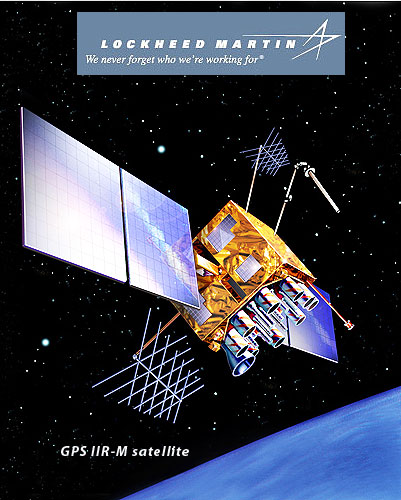Satnews Daily
August 10th, 2009
GPS Sats Are Going To Be Going, Going, Gone — IIR-M Final Flight
The U.S. Air Force is scheduled to launch the last in the series of eight modernized Global Positioning System (GPS) IIR-M satellite aboard the last Air Force procured United Launch Alliance Delta II rocket August 17 from Cape Canaveral Air Force Station, Florida.
 The launch window opens at 6:35 a.m. EDT, and will remain open for 14 minutes. Built by Lockheed Martin, the satellite offers features to include improved accuracy, enhanced encryption, anti-jamming capabilities and a second civil signal to provide dual frequency capability and improve resistance to interference. “The GPS IIR/IIR-M satellites are the cornerstone of the GPS constellation, there performance have been exceptional and we expect them to be operational well into the future,” said Col. Dave Madden, Commander, Space and Missile Systems Center’s Global Positioning Systems Wing. Lockheed Martin and the Delta II program have played an imperative role ensuring users worldwide continue to receive improved GPS services. The GPS constellation has the most satellites and the greatest capability ever. Currently, there are 30 operational satellites broadcasting worldwide, every day, 24 hours a day, 7 days a week, 365 days a year. The Air Force remains committed to providing uninterrupted positioning, navigation, and timing service to users around the globe. The Air Force Space Command’s Space and Missile Systems Center, located at Los Angeles Air Force Base, Calif., is the U.S. Air Force’s center of acquisition excellence for acquiring and developing military space systems including six wings and three groups responsible for GPS, military satellite communications, defense meteorological satellites, space launch and range systems, satellite control network, space based infrared systems, intercontinental ballistic missile systems and space situational awareness capabilities.
The launch window opens at 6:35 a.m. EDT, and will remain open for 14 minutes. Built by Lockheed Martin, the satellite offers features to include improved accuracy, enhanced encryption, anti-jamming capabilities and a second civil signal to provide dual frequency capability and improve resistance to interference. “The GPS IIR/IIR-M satellites are the cornerstone of the GPS constellation, there performance have been exceptional and we expect them to be operational well into the future,” said Col. Dave Madden, Commander, Space and Missile Systems Center’s Global Positioning Systems Wing. Lockheed Martin and the Delta II program have played an imperative role ensuring users worldwide continue to receive improved GPS services. The GPS constellation has the most satellites and the greatest capability ever. Currently, there are 30 operational satellites broadcasting worldwide, every day, 24 hours a day, 7 days a week, 365 days a year. The Air Force remains committed to providing uninterrupted positioning, navigation, and timing service to users around the globe. The Air Force Space Command’s Space and Missile Systems Center, located at Los Angeles Air Force Base, Calif., is the U.S. Air Force’s center of acquisition excellence for acquiring and developing military space systems including six wings and three groups responsible for GPS, military satellite communications, defense meteorological satellites, space launch and range systems, satellite control network, space based infrared systems, intercontinental ballistic missile systems and space situational awareness capabilities.

